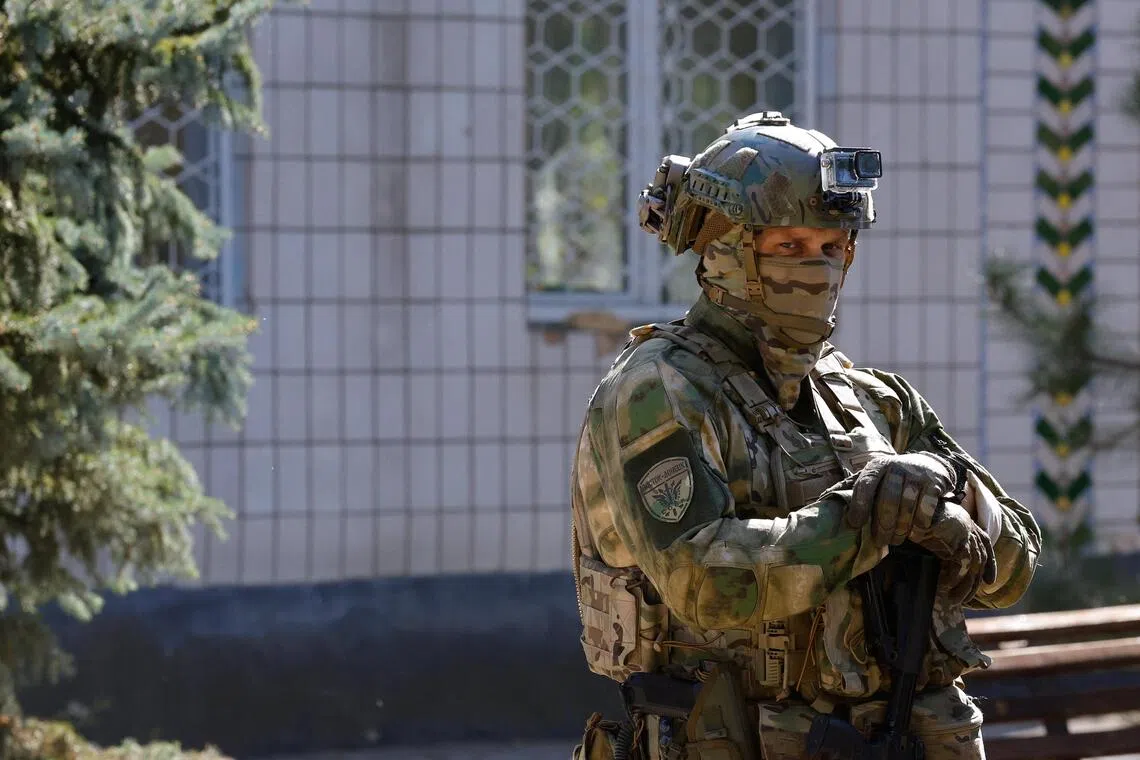UN slams ‘systematic’ Russian torture of Ukraine’s civilians
Sign up now: Get ST's newsletters delivered to your inbox

A Russian soldier standing guard outside a school in a Russian-occupied area of Ukraine on Sept 23.
PHOTO: REUTERS
Follow topic:
- UN reports Russian forces in occupied Ukraine use "widespread and systematic" torture, including sexual violence, against civilian detainees.
- 92% of released detainees interviewed by the UN described torture, beatings, electric shocks, and mock executions while detained by Russian forces.
- Ukraine also detained its citizens on national security charges and also reported isolated incidents of torture and ill-treatment of civilians.
AI generated
GENEVA - Russian authorities have subjected civilian detainees in Ukrainian areas it occupies to “widespread” and “systematic” torture, including sexual violence, the United Nations said on Sept 23.
A UN rights office report concluded that Russia “has subjected Ukrainian civilian detainees to consistent patterns of serious violations” of international law since its full-scale invasion of Ukraine in February 2022.
“Russia has detained Ukrainian civilians on a massive scale,” Ms Danielle Bell, head of the UN Human Rights Monitoring Mission in Ukraine, told reporters in Geneva.
Speaking from Kyiv, she said Ukraine’s top prosecutor had recorded more than 15,000 civilian detentions by Russian authorities, with at least 1,800 people still in custody.
“This number should be considered an absolute minimum,” she said, adding that a core finding of the report was the “systematic and widespread torture and ill treatment of (detained) Ukrainian civilians by Russian authorities”.
The report said UN investigators had interviewed 216 civilians released from detention in the occupied territories since June 2023.
It said 92 per cent of them “gave consistent and detailed accounts of having been subjected to torture or ill-treatment during their captivity”.
90 executions custody
“Severe beatings with a variety of instruments, such as batons and sticks, electric shocks to various body parts (and) mock executions” were among the methods described.
Many said they had suffered threats of death and violence to themselves or a loved one, various forms of humiliation and “a variety of stress positions”.
The investigators had documented the extrajudicial execution of 90 Ukrainian civilians in Russian detention, the report said, adding that a further 38 had “died in custody as a result of torture or ill-treatment, poor conditions of internment, or inadequate medical attention”.
The report cautioned that Russia’s frequent disregard for legal safeguards, combined with a dire lack of accountability, had “placed many Ukrainian civilians outside the effective protection of the law during their detention”.
UN rights chief Volker Turk stated that “people have been arbitrarily picked off the streets in occupied territory, charged under shifting legal bases and held for days, weeks, months and even years”.
“It is essential that the human rights of civilian detainees, who have been severely impacted by this terrible conflict, are prioritised in any peace talks,” he said.
The Sept 23 report also documented “instances of torture and ill-treatment” of civilians detained by Ukrainian authorities.
As of late July, Ukraine counted more than 2,250 conflict-related detainees in official pre-trial and penal facilities, according to the report.
The vast majority were Ukrainian nationals and only a few were Russian.
Of the 409 conflict-related civilian detainees interviewed for the Sept 23 report, 117 gave credible accounts of torture and ill-treatment in Ukrainian custody, Ms Bell said, adding that most cases occurred in 2022.
The report found that in territories it controlled, Ukraine had detained many of its own citizens on charges related to national security, including treason and espionage.
Others faced charges of collaboration linked to interactions with Russian occupying authorities, the report said.
Such charges covered a broad range of ordinary work, it said, noting that people had been prosecuted for carrying out emergency services, construction, humanitarian relief and garbage removal during the occupation. AFP

